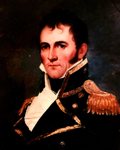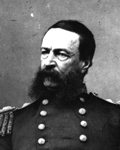 Barbary pirates, and became a prisoner-of-war when frigate Philadelphia was captured off Tripoli in 1803. Released in 1805, Porter commanded USS Enterprise and later was in charge of naval forces at New Orleans.
Barbary pirates, and became a prisoner-of-war when frigate Philadelphia was captured off Tripoli in 1803. Released in 1805, Porter commanded USS Enterprise and later was in charge of naval forces at New Orleans.
During the War of 1812, Captain Porter commanded the 32-gun frigate Essex in a cruise around Cape Horn into the Pacific, where she took as prizes twelve whaling ships before being overwhelmed by HMS Phoebe and Cherub at Valparaiso, Chile on 28 March 1814 and subsequently taken into the British navy.
Later, Porter was a member of the Board of Navy Commissioners and led an expedition to suppress piracy in the West Indies 1823–25. After resigning his commission in 1826, Commodore Porter spent three years as commander-in-chief of the Mexican Navy. He died on 3 March 1843 while serving as US Minister to Turkey.
 Mexican Navy before joining the US Navy in 1829, serving in the Mediterranean, South Atlantic and Gulf of Mexico.
Mexican Navy before joining the US Navy in 1829, serving in the Mediterranean, South Atlantic and Gulf of Mexico.
At the outbreak of the Civil War, Porter was given command of USS Powhatan and, in December, 1861, served under his foster brother, David Farragut, in the capture of New Orleans. Then, as commander of the Mississippi Squadron, he operated with Generals Sherman and Grant in opening up the Mississippi River. Later, as commander of the North Atlantic Squadron, he participated in the capture of Fort Fisher, North Carolina.
Porter received four “Thanks of Congress” during the war. Promoted Vice Admiral, he then served as superintendent of the Naval Academy before being appointed Admiral of the Navy in 1870. He died at Washington 13 February 1891.